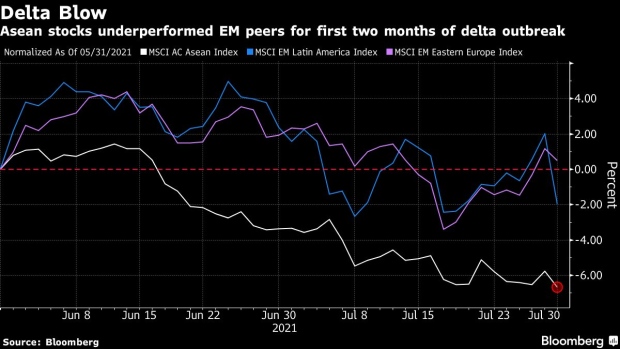Dec 5, 2021
Traders Dump Asean Stocks on Fears Omicron Will Hammer Region
, Bloomberg News

(Bloomberg) -- Emerging-market traders are taking the once-bitten, twice-shy approach with Southeast Asia and omicron, dumping shares from the region that was most impacted when the delta variant arrived.
The MSCI AC Asean Index has fallen more than 4% since U.S. Thanksgiving -- when omicron first made its presence known in markets -- underperforming the 2% decline in Latin American shares and a tiny gain in Eastern European equities. The gauge of southeast Asian stocks slumped almost 7% in the two months after the delta variant was officially named at the end of May.
Making matters worse for investors, the region is also threatened by concern over slowing growth in China and the prospect that the Federal Reserve will raise interest rates sooner than earlier anticipated. Traders are looking out for data on China’s exports and inflation this week, alongside more information on the spread and potency of the new variant.
“Omicron could further push back the timeline on any travel-related and reopening rebound, and this continued ‘stop-start’ approach to reopening could result in weaker near-term growth,” said Alexander Wolf, head of Asia investment strategy at JPMorgan Private Bank in Hong Kong. “From a stock perspective, we’ll likely see some near-term volatility given the amount of unknowns and the unclear impact on growth and policy.”
The appearance of omicron has refreshed memories of the northern summer when the combination of the delta variant surge and low vaccination rates made Southeast Asia the world’s worst virus hotspot. That led to postponed reopenings and reinstated mobility restrictions as deaths in the region soared.
Poor Progress
While progress has been made, many Southeast-Asian nations are still lagging behind in vaccinations, according to data complied by Bloomberg. The Philippines is worst, with only 34% of the population fully vaccinated, with Indonesia not far behind at 36%. Omicron is surging in South Africa, where 35% of the population are inoculated.
“The emergence of this new variant poses a near term downside risk to our constructive outlook on Asean,” said Zhikai Chen, head of Asian equities at BNP Paribas Asset Management in Hong Kong.
Still, once there is more clarity on the severity of the new variant, markets may rebound quickly, said Joshua Crabb, senior portfolio manager at Robeco in Hong Kong.
“Clearly any new waves extend the time to recovery, but so far it doesn’t appear that omicron is more deadly,” he said.
Here are some of the major events and data in emerging markets this week:
- China and Taiwan will both report export figures on Tuesday
- China’s producer-price index due Thursday is in focus as it reflects the impact of commodity-driven costs. PPI is rising at the fastest pace in 26 years. CPI is due the same day
- The Reserve Bank of India’s policy decision Wednesday will the first among major Asian central banks following the emergence of omicron. Traders will be watching for any signs of a more dovish tilt, particularly as India was the epicenter of the delta strain
- November inflation data from the Philippines will give a sense on whether the slide in oil prices and tightened travel restrictions have weighed on price growth
- Russia releases November CPI data on Wednesday. The previous month’s 8.1% rate was at the highest since January 2016
- Polish central bankers will decide on the scale of tightening on Wednesday after raising the benchmark rate by a bigger-than-expected 75 basis points last month
- Brazil’s central bank will have to choose whether to raise its policy rate on Wednesday as inflation remains elevated after an increases of 575 basis points since March
- Peru’s central bank is also set to determine whether to extend monetary tightening for a fifth month on Thursday
- Hungary will deliberate on its one-week deposit rate on Thursday, which had already been raised in the last three weeks.
©2021 Bloomberg L.P.


